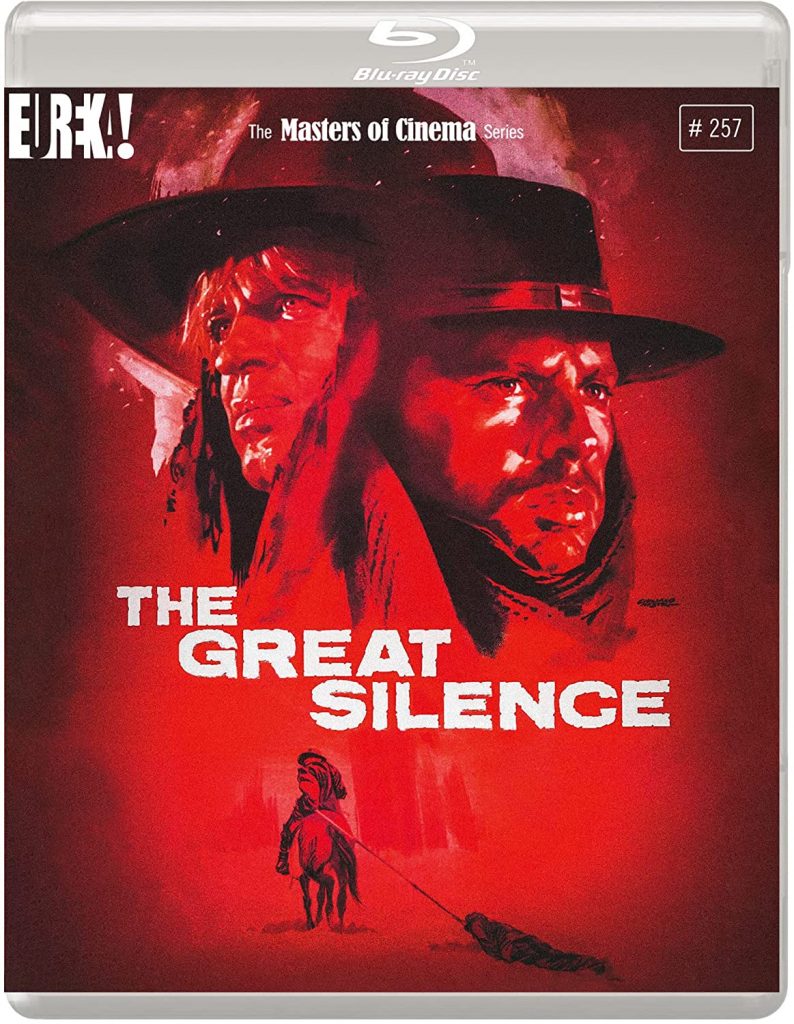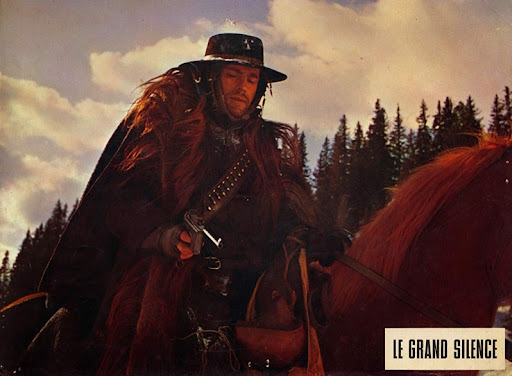
Sergio Corbucci was one of the other great Italian directors specialising in Spaghetti Westerns and in 1968 after his big hit Django (which was banned and refused a certificate in the UK for many years) he decided to make another Western, and some say his best, The Great Silence.
On an unforgiving, snow-swept frontier, a group of bloodthirsty bounty hunters, led by the vicious Loco (Klaus Kinski) prey on a band of persecuted outlaws who have taken to the hills. Only a mute gunslinger named Silence (Jean-Louis Trintignant) stands between the innocent refugees and the corrupt killers. But, in this harsh, brutal world, the lines between right and wrong are not clear.
Some Italian Westerns can be a sombre affair, but this one is definitely very bleak, it holds no prisoners and shows what a harsh and brutal world these people live in. The snowy and icy backdrop does make a big change from the usual dusty and muddy Western settings, and you can see where Quentin Tarantino got some of his influence for The Hateful Eight.
Beautifully shot with a great score by the legendary Ennio Morricone the film has had a harsh treatment on home formats but can now be seen as intended with a great new transfer, with a few minus points, and some great performances. Jean-Louis Trintignant is excellent as the mute gunslinger getting justice for those in need, and Klaus Kinski is cool, cold-blooded and menacing as the main villain.
The ending is a real shocker, not what you would normally expect from such a film. The director actually made two alternate endings and these are extras on this release and are very bizarre, especially after you see the original climax. This was done by the director in case the distributors objected to the original ending.

The transfer is from a 2K restoration and while mostly very good, especially in close-ups, it does have some other issues. The first 5 minutes or so have very noticeable posterisation, it disappears after a short while and the rest of the film is noticeably better, even if the snowy landscapes are problematic.
The colours are great, and the image is very stable, so overall a good presentation. Audio gives you Italian language with English subtitles or English dubbed version. Both were done post synch as it was shot silently and both sound fine. The ending of the film has a long explanation of what happened and the history, written in Italian. While watching with the English dub you have to turn on the subtitles to translate what is written, which should have been automatic.
Some great extras on this set includes –
- Limited Edition (3000 Copies Only)
- O-Card Slipcase
- Reversible Poster featuring the film’s original artwork
- Set of 4 facsimile lobby cards
- 1080p presentation on Blu-ray from a 2K restoration undertaken and completed for the 50th anniversary of the film’s original release
- English and Italian audio options
- Optional English Subtitles
- Brand-new audio commentary with author Howard Hughes and filmmaker Richard Knew
- Brand-new audio commentary by filmmaker Mike Siegel
- Audio commentary by director and Spaghetti Western aficionado Alex Cox, recorded live at the Hollywood Theatre, Portland in 2021. Included with kind permission of 36 Chambers LLC.
- Brand-new interview with Austin Fisher, author of Radical Frontiers in the Spaghetti Western: Politics, Violence and Popular Italian Cinema
- Cox on Corbucci – filmmaker Alex Cox talks about Sergio Corbucci [15 mins]
- Western, Italian Style – 1968 documentary [38 mins]
- Two Alternate Endings (both fully restored in 2K), with optional audio commentaries
- Trailers
- Stills Galleries
- PLUS: A Collector’s Booklet featuring new writing by Western expert Howard Hughes
FILM – 7.5 PICTURE – 7 AUDIO – 8 EXTRAS – 8